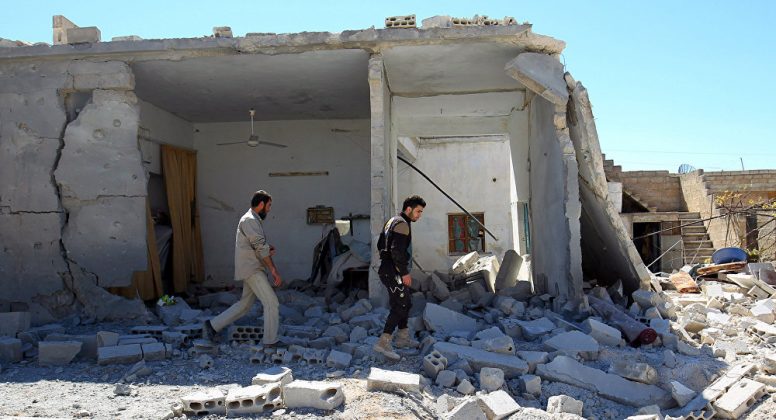Russia Debunks UN-OPCW Report Blaming Damascus for Idlib Chemical Attack
Investigation of Alleged Chemical Weapons Use in Syria’s Idlib Province
The Russian Defense Ministry, Foreign Ministry and Ministry of Industry and Trade have presented their own report on chemical attacks in Syria in the wake of a UN-OPCW document, which accuses Damascus of using chemical weapons in Khan Sheikhoun on April 4.
The Russian Foreign Ministry has stated that the risk of crimes related to chemical weapons use outside the Middle East is high.
Russia has voiced strong opposition to the use of chemical weapons, emphasizing that those guilty in such crimes should be brought to justice.
Claims that Russia is allegedly encouraging chemical weapons’ use in Syria are “hysteria” and attempts to discredit Moscow, the Russian Foreign Ministry has stated, adding that it is unacceptable to blame Damascus for it based on media reports. Moscow believes that it makes no sense for Damascus to use chemical weapons as only the opposition could benefit from it.
According to the Russian Foreign Ministry, the UN-OPCW report on the chemical weapons’ use in Syria is biased, “unprofessional and amateur.”
“Of course we expected that the mechanism and the OPCW fact-finding mission would ensure a completely unbiased and a highly professional manner of investigation to decidedly and conclusively establish the guilty party. I shall say straight away that these expectations were not met,” the head of the Non-Proliferation and Arms Control Department of the Russian Foreign Affairs Ministry Mikhail Ulyanov said at a briefing.
First investigators refused to visit the site of the alleged chemical attack in Khan Sheikhoun in the Idlib province, the Russian ministry has recalled, adding that the probe had been conducted remotely.
“The investigation … was carried out remotely in New York and the Hague offices, as well as on the territory of one of the countries bordering Syria. This could not help but affect the quality of the investigation, which turned out to be extremely low.”
Les resten:
Russia Debunks UN-OPCW Report Blaming Damascus for Idlib Chemical Attack
The Ru
NYT Balfour anniversary discovery: Zionists are psychedelic sea slugs!
By Kevin Barrett, Veterans Today Editor
100 years to the day after the Balfour Declaration, the New York Times has finally published its long-awaited exposé revealing the hideous truth behind the phenomenon of Zionism. But that story does not appear on the front page. Instead, it is in the science section.
NYT has discovered that the sea slug Cratena Peregrina (like the Zionist entity) practices “kleptopredation.” That means it isn’t content to just rob you. It eats you as well. (Or vice versa, depending on how you look at it.) As the Times explains:
Think of it like wielding a living (EDIBLE -KB) fishing rod. Or eating a turducken. Whichever your preferred analogy, kleptopredation — using one prey item to obtain another prey item — falls outside ecologists’ traditional classifications of feeding behavior. There’s predation, and there’s so-called kleptoparasitism (when one animal takes food from another animal, like a pack of hyenas stealing a fresh kill from a lion). But kleptopredation is something new.
Or maybe not so new. Kleptopredation precisely describes what the Zionists have done to the British and US empires and their prey, starting with Palestine.
100 years ago, the Balfour Declaration enshrined the most audacious act of kleptopredation in human history. The Rothschild Zionists manipulated the world’s then-biggest predator, the British, into devouring prey it otherwise never would have captured (the Ottoman Empire including Palestine).
Les resten:
From the album, River of Dreams (1993), «Two Thousand Years» finds Billy Joel being reflective as the line «time is relentless»












